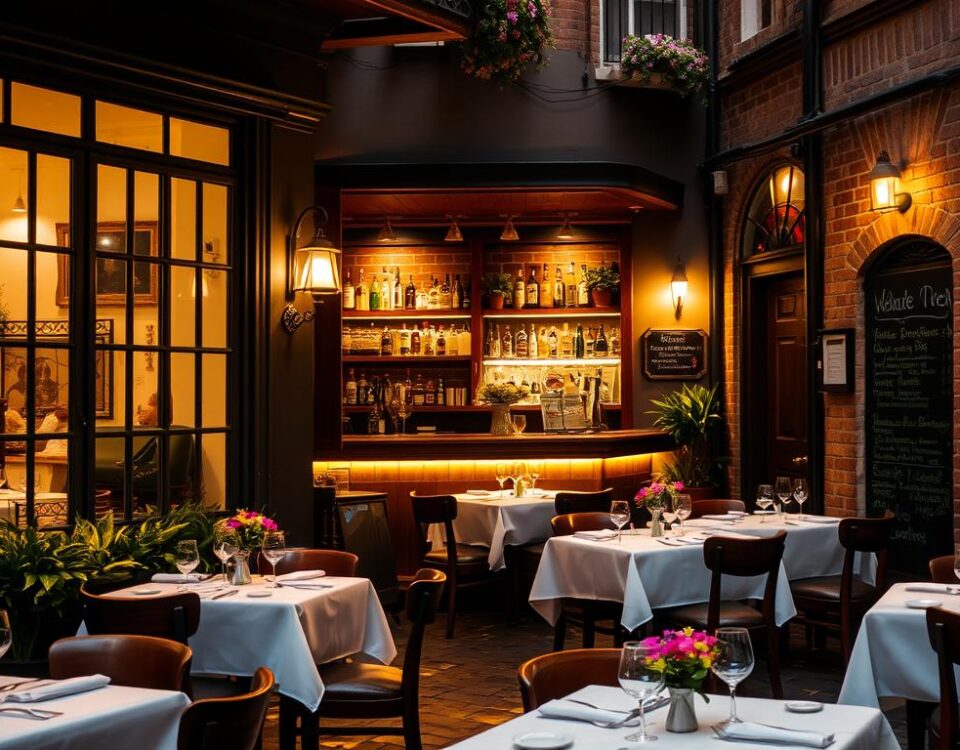
How to Open a Restaurant on a Tight Budget
August 11, 2025
Menu Engineering: Designing a Profitable Restaurant Menu
August 12, 2025As I reflect on my journey of opening my first restaurant, I’m reminded of the numerous challenges I faced. The harsh reality is that many new restaurants fail within their first year, often due to avoidable mistakes. Understanding these pitfalls can significantly boost your chances of success in the competitive restaurant landscape.
From my experience and observations of fellow restaurateurs, it’s clear that careful planning and awareness of potential issues are crucial. By learning from others’ costly errors, you can navigate the complex process of opening your first restaurant more effectively. What are the critical mistakes that can make or break your restaurant’s future?
Key Takeaways
- Understand the common pitfalls that lead to restaurant failure.
- Learn from others’ experiences to avoid costly mistakes.
- Develop a comprehensive business plan tailored to your restaurant’s needs.
- Choose a location that aligns with your target audience and business model.
- Effective staff management is crucial for long-term success.
My Journey Into Restaurant Ownership
The decision to open my own restaurant was a pivotal moment, marking the beginning of a challenging yet rewarding experience in the restaurant industry.
As a passionate home cook, I had always dreamed of sharing my culinary creations with a wider audience. However, the reality of becoming a restaurant owner was far more complex than I anticipated, involving countless moving parts that required simultaneous management.
My limited background in the food industry meant that I encountered several learning experiences along the way. I learned valuable lessons about business planning, financial management, and customer relations, which ultimately shaped my approach to restaurant management.
Through my journey, I discovered that the key to success lies in balancing the creative aspects of running a restaurant with the business side of the operation. My experience taught me that with careful planning and a willingness to adapt, it’s possible to overcome the challenges and achieve success in the restaurant business.
| Key Challenges | Lessons Learned |
|---|---|
| Managing multiple tasks simultaneously | Effective time management and prioritization |
| Financial management | Budgeting and cost control |
| Customer relations | Importance of customer service and feedback |
Skipping the Business Plan
Opening a restaurant without a business plan is like navigating uncharted waters without a compass. I initially underestimated the importance of a comprehensive business plan, thinking my culinary passion would be enough to sustain the restaurant.
A proper business plan serves as your roadmap, outlining everything from your concept and target market to financial projections and marketing strategy. It helps the business owner set future objectives as well as strategies to achieve them.
- A business plan should include detailed sections on your restaurant concept, market analysis, organizational structure, menu development, and financial projections.
- Having a solid business plan not only guides your decisions but also proves essential when seeking funding from investors or financial institutions.
- Resources like SCORE or the Small Business Administration offer templates and guidance for creating effective business plans.
The time invested in creating a thorough business plan will save you countless hours and dollars in prevented mistakes. By doing your planning, you can budget, saving time, money, and stress in the process.

Choosing the Wrong Location

One of the most crucial factors in determining the success of your restaurant is its location. A well-chosen location can significantly enhance your business‘ visibility and attract more customers. When evaluating potential locations, consider factors such as foot traffic, proximity to complementary businesses, and neighborhood demographics.
I’ve seen many promising restaurant concepts fail due to poor location choices. For instance, a fine dining establishment might struggle in a college town, while a quick-service restaurant might thrive there. The key is to ensure that your location aligns with your concept and is accessible to your target market.
- Many first-time restaurant owners prioritize rent costs over strategic positioning.
- Conducting thorough traffic pattern studies and demographic research is crucial before committing to any space.
- Visibility from major roads or pedestrian areas can significantly reduce marketing costs.
By carefully evaluating these factors and choosing a location that balances affordability with accessibility, you can set your business up for success and attract a steady stream of customers.
Underestimating Restaurant Opening Costs
One of the most significant challenges I faced when opening my restaurant was underestimating the costs involved. Initial startup and operating expenses can be budgeted for, but it’s crucial not to be naive to the possibility of unexpected costs.
To avoid financial surprises, it’s essential to create a detailed budget that accounts for every foreseeable expense. I recommend adding at least 20-30% to your initial budget for unexpected costs that inevitably arise.
- Common startup expenses that new restaurant owners often underestimate include permits and licenses, equipment purchases, renovation costs, initial inventory, and staff training.
- Many restaurant owners focus on big expenses but overlook smaller costs like menu printing, POS systems, website development, and initial marketing.
- Having sufficient operating capital for at least the first 6-12 months is crucial, as most restaurants don’t achieve profitability immediately.
Working with an experienced restaurant consultant or accountant can help you create more accurate cost projections and avoid financial surprises. Delays in construction, permitting, or equipment delivery can extend your pre-opening period, increasing costs before you generate any revenue.
Expecting Immediate Profitability
One of the biggest mistakes new restaurant owners make is expecting to turn a profit from the very start. Until the word gets out about your new business, be prepared to take some initial losses. Ensuring that those first opening months are the best they can be is crucial, so visitors will return and help spread the word for future success.

Most successful restaurants take 6-12 months to reach consistent profitability, with many taking even longer to recoup initial investments. During this time, you’ll likely face higher than normal labor costs as you train staff and work out operational inefficiencies. It’s essential to have sufficient capital reserves to weather this initial period, which can last a significant part of the first year.
Rather than focusing solely on immediate profits, prioritizing customer experience and operational excellence in the early months is recommended. Building a loyal customer base that provides consistent business is more valuable than maximizing early profits at the expense of quality or service.
Neglecting Staff Training and Operations Manuals

I’ve learned that comprehensive staff training is not just a necessity, but a critical investment in my restaurant’s future. Proper training and well-documented operations manuals are essential for maintaining high standards in food quality and customer service.
Many new restaurant owners underestimate the time and costs associated with staff training. For franchises, corporate often provides this, but it’s crucial to ensure you have it and create your own operation manuals specific to your business if needed.
- I learned the hard way that comprehensive staff training is not an optional expense but a critical investment in my restaurant’s success.
- Well-trained staff directly impacts customer satisfaction, operational efficiency, and ultimately your bottom line.
- Creating detailed operations manuals for every position ensures consistency in service and food quality, even when you’re not personally overseeing every shift.
- I recommend developing standardized training programs for both front and back of house staff that cover not just technical skills but also your restaurant’s culture and values.
- Investing in management training is particularly important, as your managers will be responsible for maintaining your standards when you’re not present.
By prioritizing training and developing robust operations and management systems, you can ensure your restaurant runs smoothly and maintains high quality standards.
Creating an Overly Complicated Menu
I learned the hard way that an overly complex menu can be detrimental to a restaurant’s success. When I first started, I tried to please everyone with a wide variety of dishes, but this approach led to confusion and overwhelmed my customers.
An overly complicated menu not only confuses customers but also increases food costs and slows down kitchen operations, often resulting in inconsistent quality. To avoid this, I recommend starting with a focused menu of 20-30 items that showcase your concept and can be consistently executed at a high level.
Customers appreciate a well-curated selection of excellent dishes over an extensive list of mediocre options. Consider implementing a seasonal rotation of special food items to provide variety without expanding your menu unnecessarily.
Overlooking Permits and Licensing Requirements

When I opened my first restaurant, I was caught off guard by the intricate process of obtaining the required permits and licenses. Many restaurant owners start leasing their space with ambitious opening plans, only to find themselves delayed by months due to the complex permitting process.
Common required permits include business licenses, food service permits, health department approvals, liquor licenses, sign permits, and certificates of occupancy. It’s crucial to research these requirements thoroughly before signing any lease agreements or making major investments.
Many restaurant owners fail to account for the time required to obtain these permits, which can drain financial resources. I recommend building relationships with local regulatory officials to navigate the permitting process more smoothly. Additionally, hiring a consultant or attorney with experience in restaurant permitting can save significant time and prevent costly mistakes.
Be especially careful with liquor licenses, which often have the longest lead times and most complex application processes. Always budget for permit and licensing fees, which can add up to thousands of dollars depending on your location and concept.
Poor Timing for Your Restaurant Opening
I’ve seen restaurants fail due to poor timing, a mistake that can be avoided with careful planning. The timing of a restaurant’s opening can significantly impact its initial success and long-term viability. When deciding on an opening date, it’s crucial to consider seasonal factors, local events, and tourism patterns.
For instance, opening a restaurant in a ski town during the off-season can be challenging due to the reduced number of potential customers. Similarly, avoiding major holiday periods for openings is advisable due to potential staffing challenges and supply chain disruptions. A soft opening period of 1-2 weeks can help work out operational kinks before the official grand opening.

| Timing Factor | Impact on Restaurant |
|---|---|
| Seasonal Factors | Affects customer volume and menu offerings |
| Local Events | Can boost customer numbers if aligned with events |
| Tourism Patterns | Influences daily customer traffic |
By carefully planning the opening day and considering these factors, restaurant owners can set their business up for success. It’s also essential to plan the marketing timeline effectively to build anticipation without creating unrealistic expectations.
Ignoring Market Research and Customer Preferences
One of the most significant mistakes new restaurant owners make is neglecting market research. Even if you have the best recipes, you need to ensure you’re offering food that people want. Not everyone may like your style of food, and that’s okay, but you need to do market research to fill a need for a certain kind of food and offer it at the right price.
Understanding your target demographic’s preferences, dining habits, and price sensitivity is essential for creating a successful restaurant concept. I recommend using a combination of surveys, focus groups, and competitor analysis to validate your concept before investing. Pay attention to local dining trends, but also identify gaps in the market that your restaurant could uniquely fill.
Ongoing customer feedback through comment cards, social media, and direct conversations helps your restaurant evolve with changing preferences. The restaurant industry is constantly changing, making continuous research essential even after you’ve established your business. By staying attuned to your customers and adapting to their needs, you can ensure long-term success.
Neglecting Marketing and Communication

Effective marketing is the backbone of any successful restaurant business. In today’s competitive industry, it’s not enough to serve great food; you need to promote it effectively to attract and retain customers. I initially underestimated the importance of marketing, believing that word of mouth would naturally bring in friends and customers.
However, I’ve learned that effective restaurant marketing begins before you open and continues throughout the life of your business. I recommend allocating 3-5% of your projected revenue to marketing efforts, especially during your first year. Creating a strong online presence through a professional website and active social media accounts is essential.
- Many new restaurant owners focus exclusively on traditional advertising and neglect the power of social media for building community and showcasing their food.
- Encouraging customers to share their experiences on social platforms by creating “Instagrammable” moments in your restaurant can generate valuable free publicity.
- Building relationships with local food bloggers, journalists, and influencers can help spread the word about your restaurant to their followers.
- Don’t forget about email marketing—collecting customer emails allows you to share promotions, special events, and updates directly with people who have already shown interest in your restaurant.
By investing in marketing and communication from the beginning, you can promote the opening of your restaurant effectively and build a loyal customer base.
Failing to Maintain Work-Life Balance
One of the most significant challenges I faced as a new restaurant owner was finding a balance between my work and personal life. Running a demanding restaurant business can easily consume your time, leaving little room for family and personal activities.
Many new restaurant owners work 80+ hour weeks, leading to burnout and strained relationships. To avoid this, I learned to build a strong management team and delegate responsibilities effectively. This not only ensures the business runs smoothly but also allows for personal time and family commitments.
- Creating clear boundaries between work and personal life is essential.
- Scheduling personal time with the same commitment as business responsibilities helps maintain a healthy balance.
- Including family members in business planning sets realistic expectations.
| Tips for Balance | Benefits |
|---|---|
| Delegate tasks effectively | Reduces stress and workload |
| Schedule personal time | Improves work-life balance |
| Involve family in planning | Sets realistic expectations |
By prioritizing balance, restaurant owners can maintain their passion and creativity, ensuring a successful business and a fulfilling personal life, every day.
Conclusion: Learning from Others’ Restaurant Opening Mistakes
Having spent years in the restaurant industry, I’m convinced that learning from others’ mistakes is crucial for success. Throughout this article, I’ve shared common restaurant opening mistakes that new owners should avoid to improve their chances of running a thriving business.
The key to a successful restaurant lies in proper planning, realistic expectations, and a willingness to learn. I encourage aspiring owners to seek mentorship from experienced restaurateurs and join industry associations to gain valuable insights and support. While avoiding common mistakes won’t guarantee success, it will significantly enhance your prospects in this competitive industry.
I wish you the best of luck on your restaurant journey and hope these insights help you create a sustainable business. With persistence, adaptability, and the right guidance, you can overcome the challenges and achieve your goals.
FAQ
What are the most significant expenses to consider when starting a restaurant?
When starting a restaurant, some of the most significant expenses include inventory, equipment, rent or mortgage, staffing, and marketing. It’s essential to create a comprehensive budget to ensure you have enough funds to cover these costs.
How can I ensure my restaurant’s concept is viable?
To ensure your restaurant’s concept is viable, conduct thorough market research to understand your target audience, their preferences, and the competition. This will help you create a unique selling proposition and tailor your menu, service, and overall experience to meet customer demands.
What is the importance of having a business plan for my restaurant?
A business plan is crucial for any restaurant as it outlines your goals, target market, financial projections, and operational strategy. It serves as a roadmap, helping you stay focused and make informed decisions as you navigate the challenges of running a successful restaurant.
How can I manage my staff effectively?
Effective staff management involves providing comprehensive training, creating clear operational manuals, and fostering a positive work environment. This helps ensure your staff is equipped to deliver excellent customer service and maintain a smooth, efficient operation.
What are some common pitfalls to avoid when creating my menu?
When creating your menu, avoid offering too many dishes, as this can lead to inventory management issues and confuse customers. Focus on a concise menu that showcases your culinary strengths and caters to your target audience’s tastes.
How can I balance my work and personal life as a restaurant owner?
As a restaurant owner, maintaining a work-life balance can be challenging. To achieve this, delegate tasks effectively, prioritize your time, and establish clear boundaries between your work and personal life. This will help you avoid burnout and maintain your overall well-being.
What role does marketing play in my restaurant’s success?
Marketing plays a vital role in your restaurant’s success, as it helps you reach new customers, build brand awareness, and drive sales. Develop a comprehensive marketing strategy that includes social media, advertising, and public relations to attract and retain customers.



